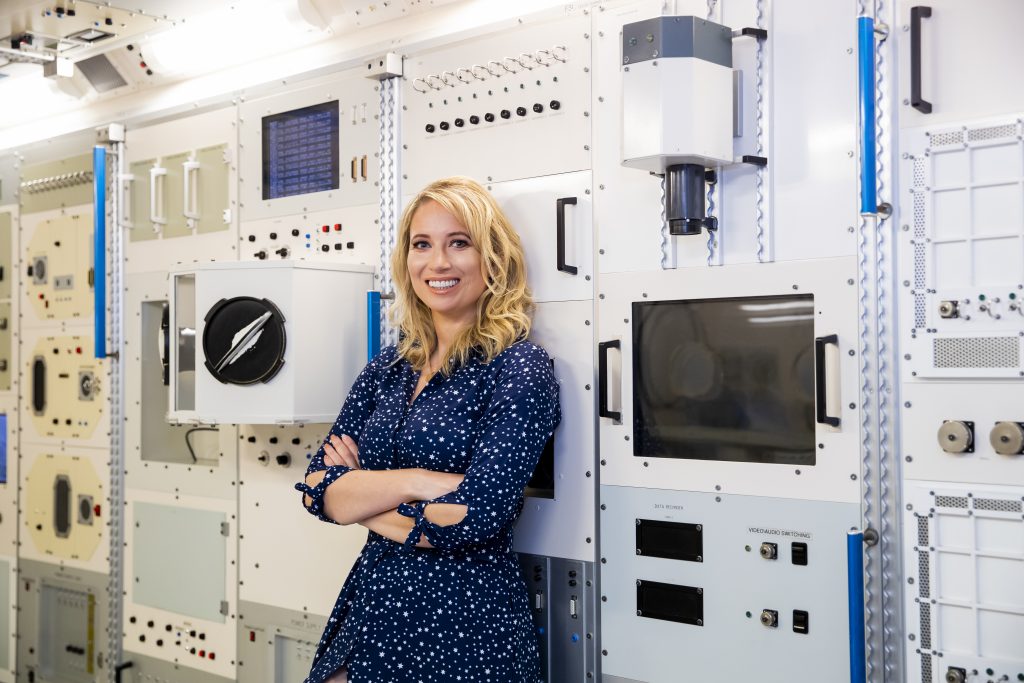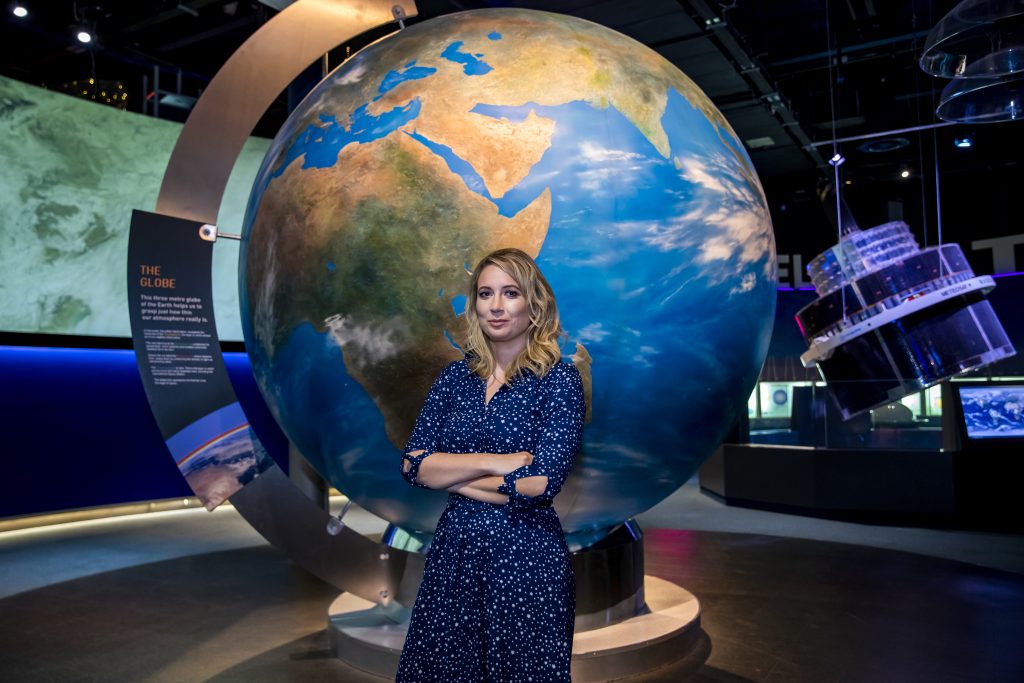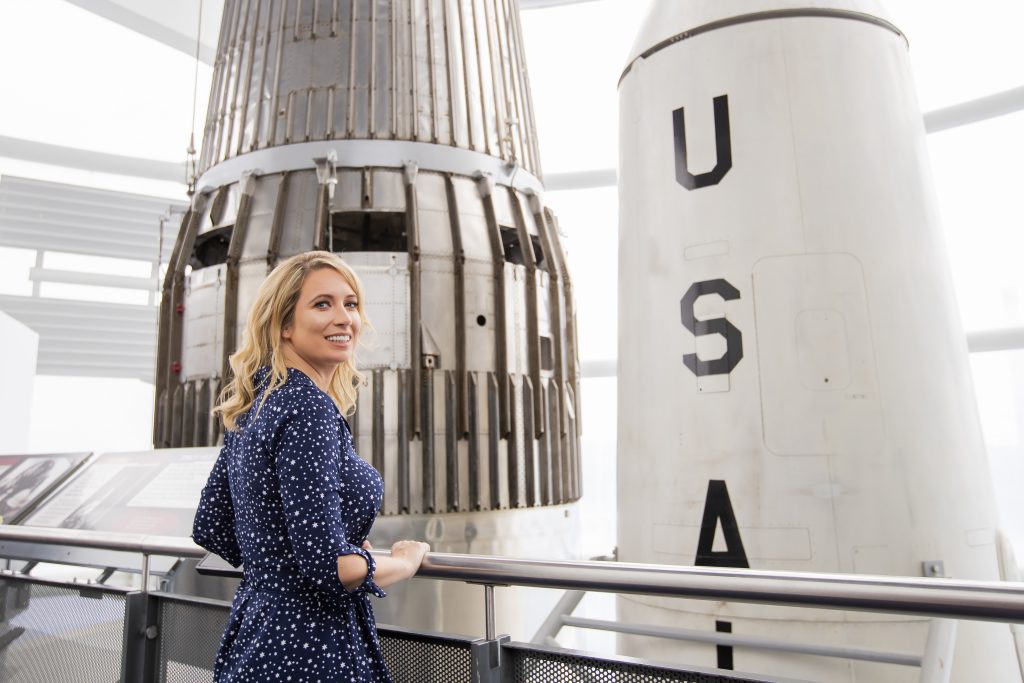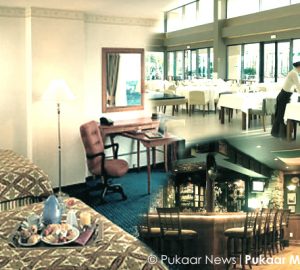“Learning about space teaches us that the sky is no longer the limit”
Our editor, Gita Sarasia, spoke to Sarah Cruddas who is a space journalist, author and international television host. As an alumni of the University of Leicester, she has an academic background in astrophysics and is a global thought leader in the commercial space sector.

Growing up in Hull, one of Sarah’s earliest memories is of looking up at the moon in the night’s sky. After learning more about space at school, she was fascinated and it was a feeling that remained with her and later inspired her decision to study Physics with Astrophysics at the University of Leicester. “That search for meaning has stayed with me, that wanderlust that comes from looking up and being inspired about the universe above us,” she explains, adding: “It’s something that has stuck with me since being a small child”.
Of her time spent in Leicester as a student, Sarah reflects with fondness: “I had so many friends here, so many incredible memories. From nights out to being around the city and going to the Golden Mile during Diwali and getting loads of very fattening but very delicious sweets”. She had been encouraged to study in Leicester by the exciting opportunities offered by the city’s National Space Centre and was impressed by the reputation that the University of Leicester had amassed in her chosen field – particularly since it has run the longest-established Physics with Astrophysics degree in the UK. The alumni explains: “The physics department and astronomy department at the University of Leicester is really world class so I was sold on the city,” adding: “It just felt like a place where my space dreams could eventually come true.”
When considering the career that Sarah has established, it would be fair to assume that her space dreams did indeed come true. Starting off in television as a weather presenter and science correspondent with the BBC, she has gone on to travel the world filming documentaries for hosts including Discovery Channel and Science Channel and written four books about space exploration. But how exactly did a curiosity for space develop into a passion for storytelling? According to Sarah, it was a trip to a new cultural world that inspired her to combine her passion for space with journalism. “I went travelling around South America in between my second and third year of university and I saw a different world … I saw poverty that I hadn’t seen before, I saw completely different cultures and I wanted to show people the world.”
But alongside unveiling distant cultural worlds through her journalism, Sarah’s mission has remained highlighting the wonders of space to the masses. She encourages people to not only look up, but look around at how space exploration has shaped our daily lives. Although we may not have the flying cars and moon holidays that were promised by the 1960’s, Sarah maintains that we live in a space age. “We dumped into cyberspace instead of outer space but our world of today is transformed by space exploration,” she explains. “If you want to call a car or call food, you’re relying on satellites in space and yes, there is that argument that we’d have got all of this great technology anyhow, but space exploration has accelerated that because when you strive for something great, something impossible, there’s a trickle-down effect that benefits all of us.” In keeping with benefiting us all, she’s also keen to demonstrate how humanitarian causes such as cancer research have been helped along and how space research has aided in solving crises that have occupied the world stage: “There was an incident in Nigeria where some girls were kidnapped a few years ago by Boko Haram and satellites in space were able to help hunt for those girls.”

Throughout her career she’s had the opportunity to work with globally prominent figures – some of whom have generated headlines in recent times with space flights.
“I have been fortunate enough to work with people who inspired me. I’ve worked with Buzz Aldrin and Michael Collins from Apollo 11… Jeff Bezos, Richard Branson, so many people, so many astronauts.”
Though Sarah is keen to shine a light on the unsung heroes of the industry, essentially, the people who fuel the engine of space exploration: “To me there’s so many heroes, the astronauts are just the tip of the iceberg in terms of what we do in space exploration, there are thousands of people who make space exploration possible so in an era where we kind of idolise celebrity, I don’t like to do that, I think we should celebrate all the incredible, hardworking people.”
Being a passionate advocate of commercial space travel, Sarah is adamant that in the future, space travel for civilians should and will be more than just the pursuit of ambitious billionaires. “If we are to succeed as a species in exploring space and becoming a multi-planetary species then space needs to be for everyone, it can’t just be for a niche group of people,” she explains. For her, diversity is a concept that supersedes the parameters of our planet. “Fewer than six hundred humans have been to space and they were mostly white military men or people with an engineering background. So they represented a niche type of person, so what we’re seeing now with commercial space is that different types of people can access space – people who might be artists or musicians or from all kinds of backgrounds.”
Currently sitting on the board of directors of Space for Humanity, an organisation dedicated to opening up access to space, Sarah explains that the goal is to open up space flights to people from more diverse backgrounds. “It’s no different to what we’ve seen throughout the history of exploration, governments generally go first and then private entrepreneurs and explorers follow but what it means is a reduction in the cost of access to space because private companies can take risks that governments can’t.” To her, achieving this goal could significantly influence the depth of ideas being contributed to society: “If we’ve sent military personnel and engineers to space and they’ve come back artists and priests and with a newfound love of planet Earth, what happens when we send a different type of person to space? What kind of game-changing thing are they going to do from Earth from that shift in perspective that they gather from seeing the Earth in that unique way?”
According to Sarah, the upcoming entrepreneurial space age will rest on the potential of future generations, who she believes will witness science fiction becoming a reality. “The first person to walk on Mars is likely a school aged child right now. So our Mars walkers, the first human beings to step foot on another planet are among us already and I love that and we’ve got to inspire them”. Despite this, she is keen to emphasise that space is for everyone. “I don’t care whether you’re six or sixty-six, you can still be inspired by the possibility and the wonder to come from space exploration.”







